Home > 20- ENGLISH - MATERIAL AND REVOLUTION > Who Was Lumumba ?
Who Was Lumumba ?
Sunday 14 October 2018, by
Mobutu, Kasa-Vubu, Tshombe : the killers
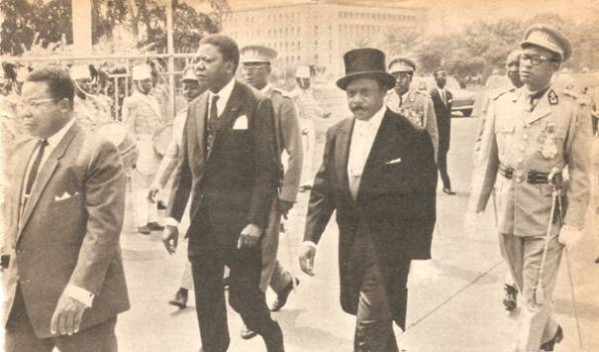
With his killer Mobutu
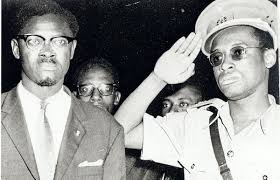
And the others who decided of his death
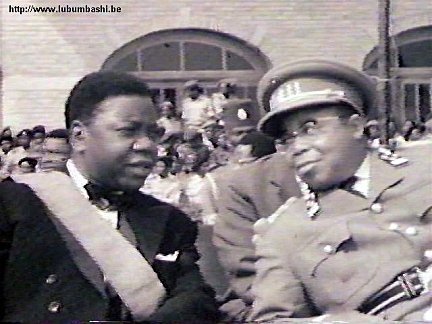

President
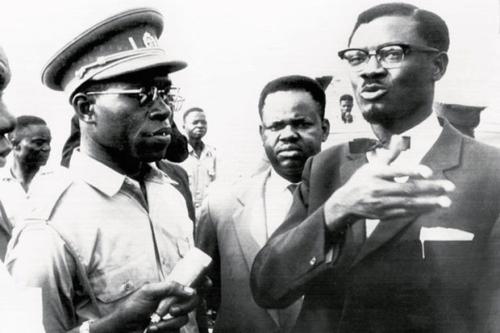
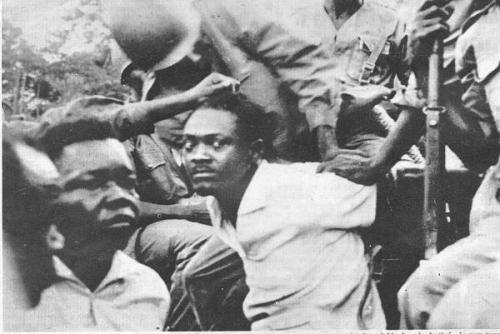
Arrested
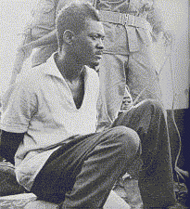
Who Was Lumumba ?
Lumumba is one of the most beloved African leaders of the Independence. He was victim of the hate of the whole bourgeoisie, the leaders of Congo’s independence as well as all bourgeoisies in the world. And, first of all, the imperialist bourgeoisie of USA, Belgium and France, and their governments. And they killed him… But the people of Congo was also killed and all the extraordinary bursting explosion of the revolution of Congo was lost because of Lumumba’s politics. He said to people: take confidence in United Nations, take confidence in Congo’s bourgeoisie leaders, take confidence in new Congo’s army and his chief Mobutu. He never said to oppressed and exploited people : organize yourself independently, take arms, take the power and don’t let the bourgeoisie’s leader in the power. And all of his politics was naïve, false and dangerous, for himself but also for the Congo’s exploited people who trusted him.
Clearly, everything the planet had of exploiters wanted to murder Lumumba. However, were his ideas enough to fight all these raptors! Did he not have illusions in the progress of the ruling classes, including those of the rich countries? Was he not counting more on their good faith than on the revolutionary force of the masses? Did he not want to found a bourgeois state with an army, a police force, rather than arming the workers? Did he not deceive himself into thinking that he would definitely overthrow imperialism in his own bases by relying on the revolutionary struggle of the proletarians? Illusions, even in good faith, are a source of bloody consequences...
"It’s the mass that drives us, it wants to go much faster than us."
Patrice Lumumba
From an interview to a "France-Soir" correspondent on July 22, 1960 :
Question: "Some of your political opponents accuse you of being a Communist. Could you reply to that?"
Answer of Lumumba: "This is a propagandist trick aimed at me. I am not a Communist. The colonialists have campaigned against me throughout the country because I am a revolutionary and demand the abolition of the colonial regime, which ignored our human dignity. They look upon me as a Communist because I refused to be bribed by the imperialists.We are neither Communists, Catholics nor socialists. We are African nationalists. We reserve the right to choose our friends in accordance with the principle of positive neutrality.”
ADDRESS OF INDEPENDENCE:
Baudouin I of Belgium:
"The independence of the Congo is the culmination of the work conceived by the genius of King Leopold II, undertaken by him with tenacious courage and continued with perseverance by Belgium.It marks a decisive hour in the destinies not only of Congo himself but I do not hesitate to say it, of all Africa. "
J. Kasa Vubu:
" The independent Congo that you have created, tells you with emotion its infinite gratitude and solemnly assures you that you will never be forgotten."
PE Lumumba:
"We knew the ironies, the insults, the blows we had to suffer morning, noon and night, because we were negroes, who would forget that a black man said" you ", not as a friend, but because the honorable "you" was reserved for the whites only? (...) We will effectively eliminate any discrimination whatsoever and give everyone the right place that will earn him his human dignity, his work and his dedication to country.
We are going to reign, not the peace of guns and bayonets, but the peace of hearts and good wills. (Applause.)
And for all that, dear compatriots, rest assured that we will be able to count, not only on our enormous strengths and immense wealth, but on the assistance of many foreign countries whose cooperation we will accept every day that it will be loyal and will not seek not to impose any policy on us. (Applause.)
In this area, Belgium, which finally understands the meaning of history, has not tried to oppose our independence is ready to give us its help and friendship, and a treaty has just been signed in this area. meaning between our two equal and independent countries. This cooperation, I am sure, will benefit both countries. On our side, while remaining vigilant, we will be able to respect the freely agreed commitments. "
Everyone can tell the difference between these three speeches. But, if Lumumba’s speech touches us, it contains all the illusions that have plagued the struggle of this people as that of other colonized peoples, the illusion of independence that sounds very cruelly in these anniversaries of African independence when we know the reality, for example, that of the current "independent" Congo, that is to say, the terrible suffering that the people undergo today.
On June 23, 1960, Patrice Lumumba became the first prime minister of the independent Congo. He called for the economic and political liberation of his country, and did not refuse contact with the Stalinist so-called socialist countries. That does not mean that he was a communist revolutionary. But it was embarrassing enough for the calculations of imperialism in a big rich country like Congo for imperialism and its local representatives, Tschombe and Mobutu, to do everything to make it disappear!
Lumumba first decreed the Africanization of the army and doubled the pay of the soldiers, which made it impossible for the former colonial power to control the Congolese government. Belgium, which wanted to protect its massive investments in minerals responds by sending troops to protect its citizens in Katanga (the mining region) and supports the secession of this region led by Moses Kapenda Tshombe. On July 11, the province of Katanga, home to the bulk of Congo’s copper, cobalt, uranium, gold and other minerals, announced that it was seceding. Belgium therefore supported the independence of Katanga, providing the benefits that would ensue: its investments would be sheltered in a tiny country, which should not be accountable or pay taxes to the central government of Leopoldville. In addition, the leader of Katanga, Moise Tshombe showed a particular interest for the investments of the Belgians.
The United States, for its part, aware of the vast wealth at stake, and obsessed, as usual, by the struggle against "communism", also undertook to control the political situation on the spot. CIA Director Allen Dulles predicts "a communist takeover with disastrous consequences [...] for the interests of the free world" and released a $ 100,000 emergency fund to replace Patrice Lumumba’s government with a "group" pro-Western ". President Eisenhower decreed that it would be "very difficult, if not impossible, to negotiate with Lumumba," and that the latter represented "a threat to peace and security in the world." Just that ! A former junior postal worker in the Congolese jungle at the head of a bloodless country was therefore a serious threat to a country like the United States which had the power to annihilate, in a few hours, any hint of rebellion in the country. most parts of the world.
Of course, a massive press campaign in the United States supported the idea that the Soviets through Lumumba were about to get their hands on the Congo and that the whole world was in grave danger. It must be said that it was mainly the financial interests in Katanga of certain senior officials of the American administration who were then in serious danger.
The United States therefore supported the Belgian military intervention in Katanga in the name of world peace and stability. Only the intervention of the Belgians was particularly violent and deadly, which led the UN, particularly under the pressure of many countries of the African-Asian bloc, to demand the withdrawal of the Belgians and their replacement by the UN forces. . However, we give you a thousand, the leaders of the United Nations operation in Congo were all Americans. It must be said that Lumumba did not have the favors of the United Nations, of which he had openly criticized the too pro-Western policy.
Thus, despite Lumumba’s repeated demands, the UN forces did nothing to fix the situation there. Lumumba called for UN intervention that sent troops everywhere except Katanga, and refused to oppose the "independence" of Katanga which she was aware of illegality. Deadly fighting continued and the Lumumba government had to face a second uprising in another province of the country. In this climate of confusion and chaos, Congo’s president Joseph Kasavubu decided to fire Lumumba. It must be said that the CIA was, with green banknotes, a remarkable persuasive work with Congolese politicians. Only this work had to have its limits since Lumumba, if it no longer had the favor of the president now maintained by the CIA, enjoyed the support of the Congolese parliament still largely independent. Lumumba was nevertheless removed from office and without official power continued despite all the resistance with the support of many Congolese. The parliament was close to voting its restitution when Mobutu, the army’s number one, took power in a coup designed by the Americans and placed the Congolese leaders under house arrest.
During this confused period when Lumumba did not really have any more power, "the CIA and senior officials of the US administration have continued to consider it a threat." It was said that "his talent and dynamism alone allowed him to restore his position whenever it seemed ruined", that "it was a bewitching speaker, capable of convincing massive crowds to take action," that "if he were allowed to speak to a battalion of the Congolese army, he would do what he wanted after five minutes." (Report for the US Senate of the Study Commission on Government Operations Related to Activities, November 20, 1975).
In late September, a CIA scientist, Dr. Sidney Gottlieb, arrived in Congo with a "deadly biological substance" to kill Lumumba. The virus, which was supposed to cause a deadly disease native to the Congo, traveled in the diplomatic bag. The evolution of the events in Congo wanted the virus never to be used, because the Congolese office of the CIA could not recruit a "agent of confidence in the entourage of Lumumba" before the expiry of the biological substance.
For a time, Lumumba was protected against Mobutu by the UN, which was forced, given the intense international pressure, to take some distance with Washington. Thus, in October, his place of residence is encircled and he is kept under house arrest. But at the end of November, fearing for his life, he tries to escape in order to win Stanleyville then in the hands of his supporters. He is unsuccessful and is overtaken by Mobutu’s soldiers, beaten and molested in the presence of Ghanaian UN troops, who remain impassible by order of their superiors. On December 1, he was arrested and taken away by Mobutu’s troops. A CIA cable, dated November 28, indicates that the Agency participated in the manhunt. The cable evokes the collaboration of the local CIA office with the Congolese government to set up roadblocks, and the mobilization of troops to block a route that could have allowed Lumumba to escape.
Lumumba, Maurice Mpolo and Joseph Okito are therefore detained for a time at the Thysville military camp on the orders of Mobutu. On January 17, 1961, they are transferred to Elizabethville and thus delivered by Mobutu to the hands of their enemy number one Moise Tshombe, head of the province of Katanga. They will be taken to a small house under military escort where they will be bound, humiliated and tortured by Katangese officials like Moses Tshombe, Munongo, Kimba, Kibwe, Kitenge but also the Belgians Gat and Vercheure. They will be shot the same evening by soldiers under the command of a Belgian officer. But, Belgian official secret documents, now declassified, whose reading leaves no doubt that it is indeed Belgium that bears the greatest responsibility in the assassination of Lumumba. Count Harold of Aspremont Lynden, Belgian Minister for African Affairs and close to King Baudouin, did he not write on October 5, 1960 that the main objective to be pursued in the interest of Congo, Katanga and Belgium is obviously the final elimination of Lumumba? They are Belgians, says De Witte, who directed the whole operation of the transfer of Lumumba to Katanga, until his disappearance and that of his body. Belgium was indeed the only country to recognize Katanga as an independent state and its small army was led by Belgian officers. The next day, an operation will be conducted by Belgian secret agents to remove in the acid the remains of victims previously cut into pieces. Their remains will never be found.
Several of his supporters will be executed in the days that follow, with the participation of Belgian soldiers or mercenaries. Tshombe then launches the rumor that Lumumba was murdered by villagers. This triggers an insurrection among the peasant population, who take up arms under the leadership of Pierre Mulele with the cry of "A Lumumba" or "Mulele Mai": the peasants conquered 70% of Congo before being crushed by the army of Mobutu.
In fact, murdered at age 36, Lumumba spent six years of militancy and six months in power. During his short life and still his shortest political "career", Patrice Emery Lumumba synthesized everything: the awareness of colonial oppression in its most brutal aspects, those of the Belgian administration; the desire for independence, expressed in an uncompromising challenge; the rejection of all regional or tribal particularisms; mistrust of a "national bourgeoisie" too quick to substitute for the colonizer; the dream of a united Africa in solidarity with the other liberation movements of the Third World; finally, the coalition against him of local petty traitors as well as of great private and public foreign interests.
But Lumumba also expresses all the hopeless illusions of the nationalist petty bourgeoisie of the period of independence to which Stalinism has learned nothing about socialism. He counts on bourgeois democracy, on the Congolese state, he counts on the Congolese army, he counts on the Congolese bourgeoisie even if he is wary of it. He does not impede the people; he does not disarm the military. It is he who names the one who will kill and oppress the Congolese people at length: Mobutu !!!
But above all, Lumumba has the illusion called "independence", which in no way leads to ... an impossible independence of imperialism. Cer it can only destroy or be destroyed by him!
He does not count on the struggle of the workers but on the evolution of the policy of the great powers ...
In the book of Jean-Louis Remilleux, "Dignity for Africa", the young journalist Joseph-Désiré Mobutu who took part in the economic round table for the MNC-Lumumba, delivers this premonition: ... "We made ourselves roll. Through a series of legal and technical tips, our interlocutors managed to fully preserve the hold of the multinationals and Belgian capitalists on the Congolese portfolio! ... "
Imperialism had granted independence to better avoid social revolution, but it had no intention of letting the people rule a country.
On September 5, 1960, Joseph Kasa-Vubu, hostile to Lumumba, removed Lumumba from his post and the other nationalist ministers. Lumumba is nevertheless confirmed in its statute by the Congolese House and Senate who dismiss the president. In mid-September, following a coup d’état, Joseph Désiré Mobutu seized power, created the College of Commissioners-General and assigned Congolese leaders to residence. Lumumba is placed under house arrest on 10 October. November 27, Lumumba escapes from the capital to win Stanleyville where Antoine Gigenza leads the fight of his supporters.
As he passed the Sankuru to Mweka, he was overtaken on 1 December by Mobutu’s troops, beaten and beaten in the presence of Ghanaian UN troops, who remained unmoved by order of their superiors. On December 3, he was incarcerated at Camp Hardy Thysville with his assistants Maurice M’polo and Joseph Okito. On January 17, 1961, the three men were flown to Elisabethville (in Lubumbashi) in Katanga and delivered to the local authorities. They are then escorted by military escort into a discreet little house in Mwadingusha where they will be tied up, humiliated and tortured. The same evening, they are shot by Katangese soldiers under the command of an officer of Belgian nationality (like all the Katangese officers). The next day, an operation will be conducted by Belgian secret agents to remove in the acid the remains of victims previously cut into pieces. Their remains will never be found. The death of Lumumba was only made public a month later, in February 1961, because the risk of riots had been ruled out in the east of the country.
Patrice Lumumba was born in the Belgian Congo (now the Democratic Republic of Congo). He attended the catholic school of missionaries and then, brilliant student, a Protestant school held by Swedes. Until 1954 (the year of the founding of a secular education network and the first university) colonial Belgium has little developed the education system, entirely entrusted to religious missions, the school gives only ’a rudimentary education and aims more to train workers or clerics, but Lumumba self-taught, will immerse himself in history textbooks to further study the French Revolution, the history of Haiti, the United States and the Russia.
He worked as an office worker in a mining company in South Kivu province until 1945, then as a journalist in Leopoldville (now Kinshasa) and Stanleyville (Kisangani), during which time he wrote in various newspapers.
In September 1954, he received his "registered" card, reserved by the Belgian administration to some remarkable elements of the country (200 registrations out of the 13 million inhabitants of the time).
He discovered while working for the mining company that the raw materials of his country play a capital role in the world economy, but also that the colonial administration conceals to the Congolese this potential present in the borders - also arbitrary - of the country. He then militates for a united Congo, distinguishing itself in this respect from other pro-independence leaders.
In 1955, he created an association "APIC" (Native Staff Association of the colony) and will have the opportunity to talk with King Baudouin on a trip to the Congo on the situation of Congolese.
The Congo minister at the time, Auguste Buisseret wants to change the Congo and include a public education. Lumumba adheres to the liberal party with other Congolese notables. With several of them, he goes to Belgium at the invitation of the Prime Minister.
The fight for independence.
In 1956, he is imprisoned for one year. Released by anticipation, he resumed his political activities and became sales manager of a brewery.
The Belgian government takes some liberalization measures: trade unions and political parties will be authorized for the municipal elections to be held in 1957. The Congolese political parties are sponsored by those of Belgium and Lumumba is first included in the Liberal friendly.
In 1958, on the occasion of the World Expo, Congolese are invited to Belgium. Unhappy with the unflattering image of the Congolese people conveyed by the exhibition, Lumumba and some political companions make contact with anti-colonial circles. Upon his return to the Congo, he created the Congolese National Movement (MNC), in Leopoldville on October 5, 1958 and, as such, participates in the Pan-African conference in Accra. He can organize a meeting to report on this conference during which he claims independence in front of more than 10,000 people. First political clashes in October 1959: the MNC and other pro-independence parties hold a meeting in Stanleyville. Despite strong popular support, the Belgian authorities are trying to seize Lumumba - which causes a riot that killed about thirty people. Lumumba was arrested a few days later, tried in January 1960 and sentenced to 6 months in prison on 21 January.
At the same time, the Belgian authorities held meetings with the separatists, in which Lumumba finally participated, who was therefore de facto released on 26 January. To everyone’s surprise [ref. Belgium grants to the Congo the independence which is set for June 30, 1960. At the independence ceremony of the country, on June 30, 1960, it delivers a virulent speech denouncing the abuses of the colonial policy since 1885. Instead of addressing the king present at the ceremony, Lumumba began his speech with a greeting "Congolese and Congolese, independence fighters ..." His speech proclaimed strongly that independence marked the end of exploitation and discrimination, the beginning of a new era of peace, social justice and freedom.
The MNC and its allies win the elections organized in May and, on June 23, 1960, Patrice Émery Lumumba becomes the prime minister of the independent Congo. Nevertheless, pending the formation of the first Congolese officer promotions, a large part of the army cadres remain Belgian and black soldiers revolt, killing white officers and raping Belgian women. Virtually all Belgian executives will then flee.
Lumumba decrees the Africanization of the army and doubles the pay of the soldiers. Belgium responds by sending troops to protect its citizens in Katanga (the mining region) and supports the secession of this region led by Moses Kapenda Tshombe. In September 1960, President Joseph Kasa-Vubu dismissed Lumumba and the nationalist ministers. Lumumba then declares that he will remain in office. At his request, the parliament won for his cause dismissed President Kasavubu.
Following a coup d’état, Joseph Désiré Mobutu seized power, created the College of Commissioners-General and assigned residence to Congolese leaders. In December 1960, Lumumba escaped from the capital to try to win Stanleyville, a region where he has many supporters. He was arrested on December 2, 1960 by Lieutenant Christopher Yowane Lokele as he was passing the Sankuru to Mweka. He is transferred to the Thysville military camp on the orders of Mobutu. Their transfer was considered at Shinkakasa Fort in Boma.
On January 17, 1961, Patrice Lumumba, Maurice Mpolo and Joseph Okito were flown to Elisabethville, Katanga, and delivered to the local authorities. Lumumba, Mpolo and Okito will be taken to a small house under military escort where they will be bound and humiliated by Katangese officials like Moses Tshombe, Munongo, Kimba, Kibwe, Kitenge but also Belgians Gat and Vercheure [2]. They will be shot the same evening by soldiers under the command of a Belgian officer; however, since then Belgian official secret documents, now declassified, have been read and left unmistakable as to whether Belgium bears the greatest responsibility for the assassination of Lumumba. Count Harold of Aspremont Lynden, Belgian Minister for African Affairs and close to King Baudouin, did he not write on October 5, 1960 that the main objective to be pursued in the interest of Congo, Katanga and Belgium is obviously the final elimination of Lumumba? They are Belgians, says De Witte, who directed the whole operation of the transfer of Lumumba to Katanga, until his disappearance and that of his body. Belgium was indeed the only country to recognize Katanga as an independent state and its small army was led by Belgian officers. The next day, an operation will be conducted by Belgian secret agents to remove in the acid the remains of victims previously cut into pieces. Several of his supporters will be executed in the days that follow, with the participation of Belgian soldiers or mercenaries. Tshombe then launches the rumor that Lumumba was murdered by villagers. This triggers an insurrection among the peasant population, who take up arms under the leadership of Pierre Mulele with the cry of "A Lumumba" or "Mulele Mai": the peasants conquered 70% of Congo before being crushed by the army of Mobutu.
Lumumba was greatly missed after his death by the entire community of non-aligned countries, including one of his executioners, General Mobutu who consecrated him national hero in 1966. The return of Egypt from his wife Pauline and his children was considered a national event. The day of his death, January 17, is a holiday in Congo-Kinshasa.
The role of the Western powers and that of the United States in particular has been strongly evoked in the death of Lumumba. They feared a drift from the Belgian Congo to the USSR. Indeed, Lumumba appealed to the Soviets during the Katanga war because the UN did not respond to his requests for military help to end the civil war.
The declassified CIA archives since June 21, 2007 clearly indicate that the CIA attempted to assassinate Lumumba.
In November 1962, Mr. (classified) informed Mr. Lyman Kirpatrick that he had at one time received the instructions of Mr. Richard Bissel to take responsibility for a project including the assassination of Patrice Lumumba, then Prime Minister of the Republic of Congo. According to (classified) the method was to consist of poisoning, since he mentioned having received the order to meet Dr. Sidney Gottlieb in order to obtain the mode of administration.
The United States of Dwight Eisenhower wanted to eliminate it to avoid a shift of the African giant in communism and Belgium saw in him and his theses of economic independence a threat to his economic interests in particular in the mining sector. Both countries supported Mobutu’s war effort against the Mai-Mai. Belgian mercenaries organized the Omegang operation to crush the Mayi-Mayi resistance in Kivu. The murder of Lumumba was elucidated by the Belgian courts under the impetus of François Lumumba who lodged a complaint against X, and the Belgian sociologist Ludo de Witte.
In 2002, the Belgian government acknowledged responsibility for the events that led to Lumumba’s death.
Clearly, everything the planet had of exploiters wanted to murder Lumumba. However, were his ideas enough to fight all these raptors! Did he not have illusions in the progress of the ruling classes, including those of the rich countries? Was he not counting more on their good faith than on the revolutionary force of the masses? Did he not want to found a bourgeois state with an army, a police force, rather than arming the workers? Did he not deceive himself into thinking that he would definitely overthrow imperialism in his own bases by relying on the revolutionary struggle of the proletarians? Illusions, even in good faith, are a source of bloody consequences...
1960 : Patrice Lumumba, “National Radio Address”
Statement at the Closing Session of the Belgo-Congolese Round Table Conference, February 20, 1960
Correspondence with United Nations General Secretary Dag Hammarskjöld, July & August 1960
From a letter to the President of the Security Council, August 1, 1960
Statement at a press conference in Leopoldville, August 17, 1960
Address to Congolese Youth, August, 1960
Speech at the opening of the All-African Conference in Leopoldville, August 25, 1960
From the letter to the President of the UN General Assembly, November 11, 1960
Letter from Thysville Prison to Mrs. Lumumba, 1961
Films Upon Life and Death of Patrice Lumumba :
Patrice Lumumba - Congo 1960-1970 - History channel
Congo: The Assassination of President Patrice Lumumba, Congo (1961)
Ce qu’a dit Lumumba sur ce qu’il estimait la trahison de Mobutu, peu avant sa mort
Mobutu, Roi du Zaïre de Thierry Michel
Patrice Lumumba: son discours du 30 juin 1960
